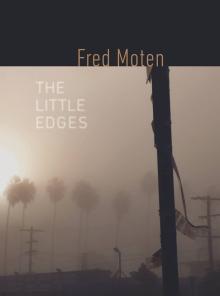
The Little Edges
In partnership with the FELIX Series of New Writing, the Wisconsin Book Festival presents, Fred Moten reading from his new poetry collection, The Little Edges. The Little Edges is a collection of poems that extends poet Fred Moten's experiments in what he calls "shaped prose"--a way of arranging prose in rhythmic blocks, or sometimes shards, in the interest of audio-visual patterning. Shaped prose is a form that works the "little edges" of lyric and discourse, and radiates out into the space between them. As occasional pieces, many of the poems in the book are the result of a request or commission to comment upon a work of art, or to memorialize a particular moment or person. In Moten's poems, the matter and energy of a singular event or person are transformed by their entrance into the social space that they, in turn, transform.
The FELIX Series of New Writing brings poets, performers, and writers of innovative new works to Madison. Since 2003, FELIX has been committed to showcasing through free public readings and lectures, the dynamic range of contemporary writing published by independent and small presses. The series is named after Felix Pollack, a librarian who developed the renowned Little Magazines Collection at the UW-Madison Library. Learn more about FELIX at felixreadingseries.wordpress.com
Fred Moten

Fred Moten is a poet and professor of English at the University of California, Riverside. He is the author of Arkansas, Poems (with Jim Behrle), I ran from it but was still in it, Hughson’s Tavern, B Jenkins, The Feel Trio, and the critical works In the Break: The Aesthetics of the Black Radical Tradition and The Undercommons: Fugitive Planning and Black Study (with Stefano Harney).
Moten’s newest book, The Little Edges (Wesleyan University Press, 2015), is a collection of poems that extends the poet’s experiments in what he calls “shaped prose”—a way of arranging prose in rhythmic blocks, or sometimes shards, in the interest of audio-visual patterning. Shaped prose is a form that works the “little edges” of lyric and discourse, and radiates out into the space between them. As occasional pieces, many of the poems in the book are the result of a request or commission to comment upon a work of art, or to memorialize a particular moment or person. In Moten’s poems, the matter and energy of a singular event or person are transformed by their entrance into the social space that they, in turn, transform.
